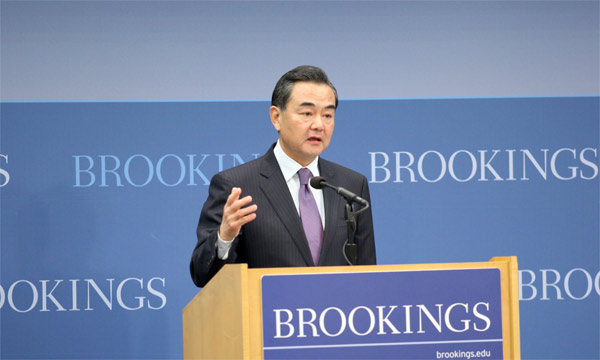New Sino-US ties sought
Updated: 2013-09-22 08:55
By Chen Weihua in Washington DC (China Daily)
|
|||||||||||
 |
|
Chinese Foreign Minister Wang Yi delivers a speech at the Brookings Institution in Washington DC on Friday evening local time. [Sun Chenbei/China Daily] |
Asia-Pacific cooperation may boost relationship, foreign minister says
Foreign Minister Wang Yi said China and the United States must prioritize their cooperation in Asia-Pacific affairs and build a new type of "major-country" relationship in the region.
Wang made the comments in his speech at the Brookings Institution in Washington DC on Friday evening local time, during his first Stateside trip since assuming his post in March.
"We have never had the strategic intention to challenge, let alone replace, the US' position in the world," Wang said.
"We have never thought about pushing the US out of the region. Rather, we hope the US will play a positive and constructive role in safeguarding peace, stability and development in the Asia-Pacific."
Wang called on the US to respect China's interests and concerns in the region. He first mentioned the Taiwan question, saying it concerns China's sovereignty and territorial integrity.
Observers have pointed out US arms sales to Taiwan have long been a destabilizing factor in Sino-US relations.
Wang believed gradual integration will ultimately lead to reunification, as the cross-Straits relationship has been better than ever, with vast improvements starting in 2008.
"For many years, the Taiwan question has been a liability in China-US relations that undermines mutual trust and disrupts cooperation," he said.
"However, if the US can go along with the prevailing trend of peaceful development of cross-Straits relations, and genuinely appreciate and respect China's efforts to oppose separation and achieve peaceful reunification, the question - once a liability and negative factor in our relationship - will be turned into an asset and a positive factor."
Wang, who served as director of the Taiwan Affairs Office of the State Council, China's cabinet, from 2008 to 2013, believes such a development will guarantee the steady long-term growth of Sino-US relations and open prospects for comprehensive cooperation.
The 59-year-old career diplomat said the two countries should also work together to produce substantive results in their cooperation over hot spot Asia-Pacific issues.
He cited the example of the Korean nuclear issue upon which he said China and the US have built much consensus. He described the Six-Party Talks as an "effective mechanism for dialogue".
He explained: "The parties concerned should commit themselves as soon as possible to the September 19 Joint Statement and work together to create the necessary conditions for the resumption of the Six-Party Talks."
He was referring to the statement on the denuclearization of the Korean Peninsula announced by the Six-Party Talks eight years ago. Wang was China's representative to the Six-Party Talks when they started in 2003.
He believes there is great potential for China and the US to cooperate in Afghanistan, especially after next year's US troop withdrawal from the war-torn nation.
"If our two countries can work with each other and bring out our respective strengths, we can turn the issue into a new highlight in our bilateral cooperation," he said.
Wang recently sent a congratulatory letter to the second China-US joint training program for Afghan diplomats launched in Washington DC this month. The Afghan diplomats will go to China later this year for the program's second leg.
The Friday address was broadcast live on C-SPAN and won applause from the audience in the room, including former senior US government officials and China experts.
Brookings Institution senior fellow Kenneth Lieberthal said that while the distrust between the two countries is very hard to change, the initiatives taken by the two countries in recent months are the right ones.
"Military exchanges of various sorts have become more frequent and more wide-ranging. We will next year have China as a participant of the RIMPAC 2014 exercise," he said, referring to the world's largest naval exercise.
"On the economic side, we reached an agreement on the S&ED (Strategic and Economic Dialogue) to accelerate the negotiation for the Bilateral Investment Treaty and to do it on the basis of a negative list, not a positive list. That's a major step forward," Lieberthal said.
A "negative list" in this case refers to a list of exceptions, with the understanding everything else is subject to the agreement, while a "positive list" only identifies areas subject to the agreement, with the understanding nothing else is subject to the agreement.
chenweihua@chinadailyusa.com
Related Stories
Imbalance seen in Sino-US talent exchanges 2013-08-01 20:05
Innovation key to new US-China relations 2013-07-23 20:33
Beijing, Washington embark on new era of co-op 2013-07-23 01:48
Kissinger and Jiang see bright future for relations 2013-07-22 21:19
Opening investment channels is key for Sino-US ties 2013-07-22 19:18
China-US S&ED Outcomes of the Strategic Track 2013-07-17 06:20
Today's Top News
New Sino-US ties sought
China prioritizes good-neighborly friendship
Islamists claim gun attack on Nairobi mall, 39 dead
Bo Xilai verdict to be announced
China sees drop in donations
Russia asks DPRK explanation
Huawei to create 5,500 jobs in Europe
Trending news across China
Hot Topics
Lunar probe , China growth forecasts, Emission rules get tougher, China seen through 'colored lens', International board,
Editor's Picks

|

|

|

|

|

|





